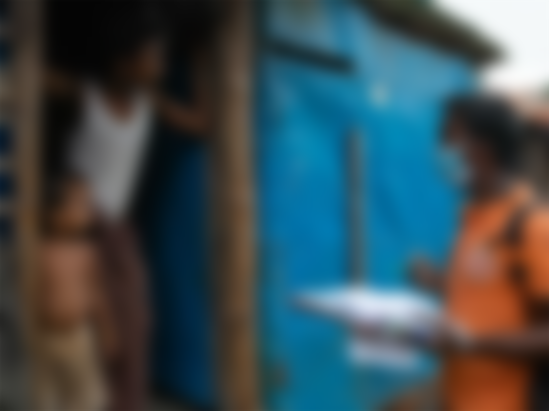A month-long door-to-door campaign to reduce the risk of global epidemics has begun.

03 September 2020
Since Kovid-19 continues to infect millions of people worldwide; That is why Rohingya refugees living in the world's largest and most densely populated refugee camps are at the highest risk.
UNICEF is working with its partners to ensure that Rohingya children living in these shelters stay healthy and that their parents and carers have adequate information on how to protect Kovid-19 and their families.
In July 2020, more than 154,000 Rohingya children aged six months to five years were able to boost their immunity under a four-week campaign to feed vitamin A supplements. These campaigns are also giving messages about testing severely malnourished children and feeding and caring for newborns and young children in the Covid-19 situation.

UNICEF Bangladesh / 2020 / Lateef Continuous monsoon rains have destabilized the Rohingya camps in various ways, including a combination of accommodation and the land on which the shelters have been built.
In a typical year, UNICEF and the nutrition sector conduct Nutrition Action Week (NAW) twice a year to routinely supplement and test children with severe malnutrition. However, due to the current risks involved in large-scale rallies, the campaign has been redesigned to better adapt to the challenges and situations posed by Covid-19.
"We had to work with implementing partners to quickly revise our plans for this year's Nutrition Action Week," said Karanveer Singh, UNICEF's nutrition manager in Cox's Bazar. He added, “A month-long house-to-house campaign was conducted to keep everyone involved in this work safer. It is one of the few vitamin A supplement campaigns around the world during the epidemic. Considering the current risk posed by heavy rainfall in the Rohingya shelters, the results from this campaign are a significant achievement for us. We have reached 98 percent of children aged 5-59 months. ”

UNICEF Bangladesh / 2020 / Lateef A UNICEF-supported community volunteer goes door-to-door to distribute vitamin A supplements and test children for malnutrition.
In addition to conducting vitamin-A supplements and malnutrition tests, these door-to-door community volunteers deliver important nutritional messages to families. Notable among the messages were raising awareness about the dangers of malnutrition and advising on effective measures to prevent children from committing suicide.

UNICEF / UN0146005 / LeMoyne A child suffering from severe malnutrition has fallen asleep on his mother's lap while waiting for counseling at a UNICEF-assisted child feeding center.
If malnutrition is not treated in time, it can have a lasting effect on children and increase the risk of child mortality. The damage to a child's physical and intellectual development from malnutrition in the first two years of life is, in most cases, permanent.
Even living in an environment where resources are extremely limited, it is imperative that parents and caregivers living in shelters be aware of the lifelong consequences of this malnutrition for the health and well-being of their children.

UNICEF Bangladesh / 2018 / Sujan The circumference of the upper part of the left arm of a child in the mother's lap is being measured.
Mothers and primary care providers were advised to breastfeed their infants and young children and to provide age-appropriate foods during the campaign. Mothers and primary care providers were trained on how to measure from the middle of a child's hand to the upper part (MUAC). This measurement of the hand is the most important indicator for knowing the nutritional status of a child. Measures led by mothers were introduced at the shelter to ensure that young children could be tested at home. This method was introduced because of the pressure on the capacity due to the epidemic.

UNICEF Bangladesh / 2020 / Lateef Baby hands are being measured as part of testing for severe malnutrition.
Humanitarian workers have a limited presence in the camps due to restrictions on the spread of coronavirus. As part of the campaign, malnourished children were tested and more than 21,300 children were identified as severely malnourished. Of these, more than 7,000 children were identified as completely new.

UNICEF Bangladesh / 2020 / Lateef A two-year-old child is being given red vitamin-supplemental capsules.
Jahanara Begum, mother of a four-year-old child, said, “My family did not know about coronavirus before. Community volunteers have told us these things. ” He added: "I'm glad they came to see my son. That's why I now understand that my son is very strong. If he is strong, I think he will be able to fight against any disease. ”

UNICEF Bangladesh / 2020 / Lateef Jahanara Begum holds her son's hand after severe malnutrition test.
Jahanara Begum and many others have not only benefited from vitamin-A supplements, they have also received life-saving information about the corona virus.
UNICEF is working to address this issue through community-level awareness; In the same way, it is important that the children are strong enough to survive not only from Kovid-19 but also from any other disease.
Related topics
Covid-19
Humanitarian action and emergency
Bangladesh
Myanmar
South Asia
Learn more from UNICEF

Press Release
06 September 2020
UNICEF donates more than জীবন 12.2 million worth of PPE and life-saving medical supplies to combat COVID-19 in Bangladesh
Visit the page

Press Release
31 August 2020
Covid-19 Isolation and Medical Center for Cox's Bazar Bangladeshi Community and Rohingya Refugees Launched
Visit the page

Picture article
Three years of Rohingya refugee crisis
Heroic ballads of children's courage, endurance and strength
See the story / article

Press Release
24 August 2020
UNICEF says refugee children are suffering due to closure of educational centers in Bangladesh's refugee camps due to Kovid
Visit the page
SHARE
Footer
UNICEF Bangladesh
Research and reporting
About us
Take action
Partners
About us
Children of Bangladesh
UNICEF on the ground
Supply and Logistics
Jobs
Other UNICEF sites
UNICEF Global
UNICEF South Asia
Social
Grants
Footer Secondary
Communication
Legal
Go to the original content
Grants
Search
UNICEF Logo Bangladesh
On toggle
Picture article
Rohingya children being fed vitamin A from house to house due to Kovid-19 epidemic
A month-long month-long Nutrition Program Week campaign has been launched to reduce the risk of global epidemics.
Rashad Wajahat Latif

UNICEF Bangladesh / 2020 / Lateef
Available at:
Bengali
English
03 September 2020
Since Kovid-19 continues to infect millions of people worldwide; That is why Rohingya refugees living in the world's largest and most densely populated refugee camps are at the highest risk.
UNICEF is working with its partners to ensure that Rohingya children living in these shelters stay healthy and that their parents and carers have adequate information on how to protect Kovid-19 and their families.
In July 2020, more than 154,000 Rohingya children aged six months to five years were able to boost their immunity under a four-week campaign to feed vitamin A supplements. These campaigns are also giving messages about testing severely malnourished children and feeding and caring for newborns and young children in the Covid-19 situation.

UNICEF Bangladesh / 2020 / Lateef Continuous monsoon rains have destabilized the Rohingya camps in various ways, including a combination of accommodation and the land on which the shelters have been built.
In a typical year, UNICEF and the nutrition sector conduct Nutrition Action Week (NAW) twice a year to routinely supplement and test children with severe malnutrition. However, due to the current risks involved in large-scale rallies, the campaign has been redesigned to better adapt to the challenges and situations posed by Covid-19.
"We had to work with implementing partners to quickly revise our plans for this year's Nutrition Action Week," said Karanveer Singh, UNICEF's nutrition manager in Cox's Bazar. He added, “A month-long house-to-house campaign was conducted to keep everyone involved in this work safer. It is one of the few vitamin-supplement campaigns around the world during the epidemic. Considering the current risk posed by heavy rainfall in the Rohingya camps, the results from this campaign are a significant achievement for us. We have reached 98 percent of children aged 5-59 months. ”

UNICEF Bangladesh / 2020 / Lateef A UNICEF-supported community volunteer goes door-to-door to distribute vitamin A supplements and test children for malnutrition.
In addition to conducting vitamin-A supplements and malnutrition tests, these door-to-door community volunteers deliver important nutritional messages to families. Notable among the messages were raising awareness about the dangers of malnutrition and advising on effective measures to prevent children from committing suicide.

UNICEF / UN0146005 / LeMoyne A child suffering from severe malnutrition has fallen asleep on his mother's lap while waiting for counseling at a UNICEF-run child-feeding center.
If malnutrition is not treated in time, it can have a lasting effect on children and increase the risk of child mortality. The loss of physical and intellectual development from malnutrition in the first two years of a child's life is, in most cases, permanent.
Even living in an environment where resources are extremely limited, it is imperative that parents and caregivers living in shelters be aware of the lifelong consequences of this malnutrition for the health and well-being of their children.

UNICEF Bangladesh / 2018 / Sujan The circumference of the upper part of the left arm of a child in the mother's lap is being measured.
Mothers and primary care providers were advised to breastfeed their infants and young children and to provide age-appropriate foods during the campaign. Mothers and primary care providers were trained on how to measure from the middle of a child's hand to the upper part (MUAC). This measurement of the hand is the most important indicator for knowing the nutritional status of a child. Measures led by mothers were introduced at the shelter to ensure that young children could be tested at home. This method was introduced because of the pressure on the capacity due to the epidemic.

UNICEF Bangladesh / 2020 / Lateef Baby hands are being measured as part of testing for severe malnutrition.
Humanitarian workers have a limited presence in the camps due to restrictions on the spread of coronavirus. As part of the campaign, malnourished children were tested and more than 21,300 severely malnourished children were identified. Of these, more than 7,000 children were identified as completely new.

UNICEF Bangladesh / 2020 / Lateef A two-year-old child is being given red vitamin-supplemental capsules.
Jahanara Begum, mother of a four-year-old child, said, “My family did not know about coronavirus before. Community volunteers have told us these things. ” He added: "I'm glad they came to see my son. That's why I now understand that my son is very strong. If he is strong, I think he will be able to fight against any disease. ”



